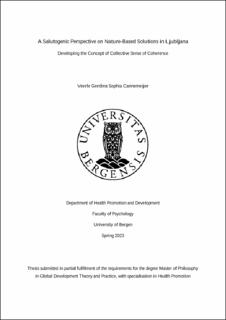| dc.description.abstract | Cities are the centres of human activity, making them both a source of environmental stressors and the origin of opportunities to enhance collective health and wellbeing. Nature-based solutions (NBS) represent such opportunities; they are solutions inspired and supported by nature that help build resilience and simultaneously provide environmental, social, and economic benefits. This study explores NBS in the Slovenian city of Ljubljana, the European Green Capital 2016 and home to ten NBS and a lot of urban nature. Using the theory of salutogenesis, the main objective is to explore the reciprocal relationship between NBS and collective health and wellbeing in this city. This is done through the exploration of shared environmental threats and stressors, the perceptions of general and resistance resources offered by NBS, their potential to contribute to a collective sense of coherence (SOC), and the effect of this collective SOC on residents’ perceptions and treatment of their environment. Utilising qualitative methods including expert interviews, cognitive mapping focus groups, and individual interviews, shared perceptions of residents of Ljubljana are explored and subsequently analysed through framework analysis. The findings show that NBS contribute to health and wellbeing in a variety of ways, offering resources to cope with environmental stressors, thereby contributing to manageability, comprehensibility, and meaningfulness. NBS are also found to contribute to a collective SOC, a contested and underdeveloped concept within the theory of salutogenesis. The discussion of this study approaches a definition and presents a model that describes how a strong collective SOC allows the collective to respond to collective stressors in a salutary way by providing and internalising resources on a collective level. This is done through collective action, enabled by a strong presence of social cohesion, social inclusion, and social justice. The conclusion establishes a reciprocal relationship between NBS and collective health and wellbeing and demonstrates the relevance of NBS to health promotion and sustainable development. | |
